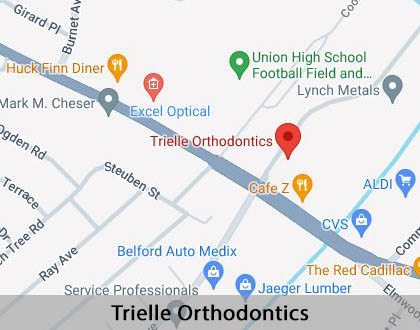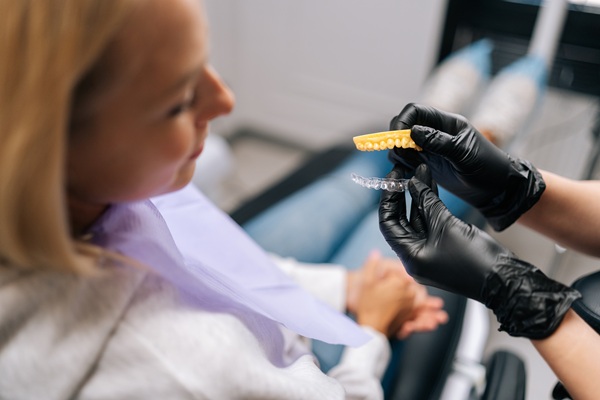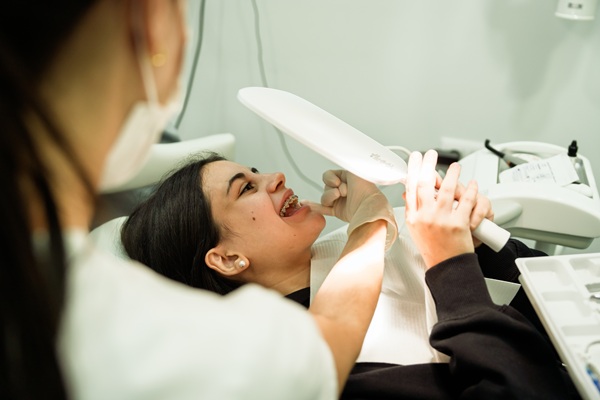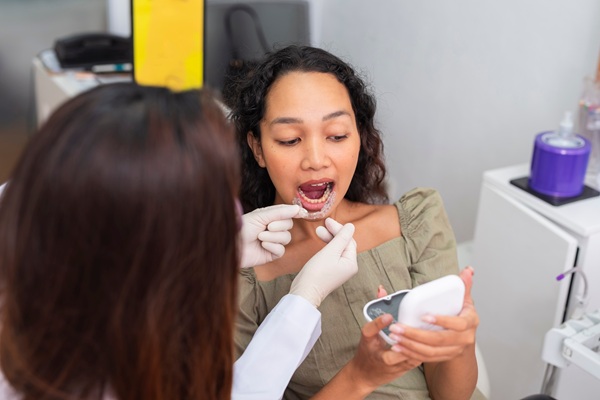Invisalign Union, NJ
Clear orthodontic aligners have been growing in popularity for many years. One of the most recognizable brands is Invisalign®. Invisalign is a form of orthodontics that uses clear tray aligners to straighten the teeth instead of the traditional mouthful of metal wires and brackets.
If you are a candidate, Invisalign provides an almost invisible way to straighten your teeth. Invisalign is available at Trielle Orthodontics in Union and the surrounding area. Call us at (908) 206-4700 to schedule an appointment to see if this treatment is right for you.
An Alternative to Traditional Braces
Invisalign uses clear tray aligners instead of metal wires and brackets to straighten teeth. The aligners are constructed of a solid piece of plastic strong enough to shift the teeth and move them into the correct position. Every one or two weeks, the patient receives a new tray with an updated aligner. Each tray will feel slightly different as it shifts and moves the teeth.
The idea of using removable aligners to adjust the teeth is not a new concept. The idea was first introduced in the 1940s. Additional improvements were made through the decades, though the technology did not improve until the 1990s. The creators of Invisalign developed their mass-market system in 1999.
“Invisalign uses clear tray aligners instead of metal wires and brackets to straighten teeth.”
Invisalign’s Three Steps
The first step to getting Invisalign is by scheduling a consultation with our orthodontist. Our staff will look at overall oral health and take impressions of the mouth. Next, that impression is sent to Invisalign and used to make aligners custom fit to the patient’s mouth.
Once the aligners have been made, our staff will make sure they fit well, answer any questions, and go over the treatment plan. Patients will be expected to wear the aligners for 20 to 22 hours a day to get results. Regular checkups with Trielle Orthodontics will make sure treatment stays on track. Our staff will determine how often new aligners are needed.
After the desired results have been achieved, the patient may be expected to wear a retainer to maintain those results. This will prevent teeth from gradually shifting back to their initial position. Our doctor will provide specific instructions on how often a retainer will need to be worn.
“The first step to getting Invisalign is by scheduling a consultation with our orthodontist.”
The Pros and Cons of Invisalign
Thanks to the fact that they are next-to-invisible, both teens and adults can avoid the discomfort and self-consciousness of traditional metal braces. Many patients also appreciate that they can take Invisalign aligners out to eat, brush and floss, or for social situations. Still, Invisalign is not without its pros and cons.
However, since they are removable, they are more likely to be lost or broken. Patients also need to be careful about what they drink when their aligners are in. Anything but water should be avoided. Liquids can seep into the plastic and stay there until the aligner is removed. This can lead to staining of the aligner and even tooth decay.
“Thanks to the fact that they are next-to-invisible, both teens and adults can avoid the discomfort and self-consciousness that comes with traditional metal braces.”
Check out what others are saying about our dental services on Yelp: Invisalign in Union, NJ
Taking Care of Invisalign Aligners
It is essential to use and care for Invisalign aligners appropriately to have a good orthodontic outcome. For Invisalign to work, the aligners have to be worn for the recommended number of hours a day. Patients should try to limit the number of times they remove the aligners since it will not take long to exceed the time they can be left off.
Cleaning the Aligners
Patients should always rinse the aligners when they are removed. Bacteria and plaque can easily attach to them, which can cause an unpleasant odor and sticky feeling on the teeth. Aligners should be cleaned with a clear and unscented antibacterial soap. If patients use toothpaste to clean the aligners, they should make sure that it is not a brand with whitening agents, as these can wear away the plastic.
Invisalign aligners also need to be stored in a case when not being worn. Leaving them out in the open exposes them to germs that can then be transferred to the mouth.
Maintain Proper Oral Hygiene
Proper oral hygiene is essential at any time, but it is a bit easier when using Invisalign versus traditional braces. Food and plaque can get trapped in conventional braces' metal brackets and can be tough to brush. Since Invisalign aligners can be removed, it is simple to brush and floss and replace the aligners when finished.
Make sure to brush and floss after meals before putting the aligners back in the mouth. This helps keep food particles from getting stuck in the aligners, leading to bacteria growth and bad breath.
“It is essential to use and care for Invisalign aligners appropriately to have a good orthodontic outcome.”
Length of Treatment Time
Only an orthodontist can reasonably predict the length of the Invisalign treatment time. The severity of the condition, how well the patient adheres to the treatment plan, and age are all factors. On average, it takes less than two years to see results. The treatment time for teens is typically a little shorter than for adults.
Following all the recommended guidelines will ensure patients do not extend the treatment time. Patients need to switch trays on schedule and talk to our staff if there are any concerns. If the aligners are not worn for the recommended time, the teeth may start to shift back to their original positions.
“Only an orthodontist can reasonably predict the length of the Invisalign treatment time.”
Questions Answered on This Page
Q. What steps are involved with getting Invisalign?
Q. What are the pros and cons of Invisalign?
Q. How do I use and care for Invisalign aligners?
Q. How long will I have to wear Invisalign aligners?
People Also Ask
Q. Can I take out my aligners for special events?
Q. What conditions can Invisalign treat?
Q. What are the aesthetic differences between Invisalign and traditional braces?
Frequently Asked Questions
Q. What is Invisalign?
A. Invisalign is an orthodontic technique that uses clear, plastic aligners to straighten the teeth. The aligners are created from a custom mold of the patient’s mouth, and new aligner trays are provided at specific intervals as part of the treatment process. Trielle Orthodontics will develop the treatment plan and monitor the process.
Q. What are the advantages of Invisalign over traditional metal braces?
A. Since Invisalign aligners are clear, patients can avoid the unsightly look of a mouth filled with metal brackets and wires. They are also more comfortable to wear and allow the patient fewer restrictions on foods they can eat. Since they are removable, it is easier to brush and floss your teeth.
Q. How long is the treatment time?
A. Treatment, on average, takes less than two years but can vary depending on the patient’s specific concerns. Aligners must be worn for 20-22 hours a day to see results. If a patient does not wear the aligners for the recommended amount of time, treatment results will take longer.
Q. Does Invisalign hurt?
A. Unlike traditional metal braces, Invisalign’s clear aligners do not rub and poke at the soft tissues of the mouth. Patients can expect to feel some sensitivity for a day or two when a new set of aligners are put in. This means the teeth are shifting, and the aligners are working. Any discomfort should go away quickly.
Q. How do you keep Invisalign aligners clean?
A. Aligners should be cleaned with a clear and unscented antibacterial soap or toothpaste. If using toothpaste, make sure it is not a brand with whitening agents, which can wear away the plastic. Always brush and floss after meals before putting the aligners back in the mouth. This helps keep food particles from getting stuck, which can lead to bacteria growth and bad breath.
Q. Do I have to avoid any foods with Invisalign?
A. You must remove the aligners before eating. You will also want to avoid drinking anything other than water when the aligners are in place. Coffee and tea can stain the aligners, while soda has acidic properties that can break down the plastic.
Quality Orthodontic Services Can Transform Smiles
By visiting us as soon as possible, our team can help get you the professional treatment you need.
Definition of Orthodontic Terminology
Learn More About Invisalign
For many patients, Invisalign is a practical alternative to traditional braces. If you are interested in finding out whether this treatment is right for you, call Trielle Orthodontics in Union at 908-206-4700 to learn more about whether or not you are a candidate.
Helpful Related Links
- American Dental Association (ADA). Glossary of Dental Terms. 2021
About our business and website security
- Trielle Orthodontics was established in 2023.
- We accept the following payment methods: American Express, Cash, Check, Discover, MasterCard, and Visa
- We serve patients from the following counties: Union County
- We serve patients from the following cities: Union, Linden, Elizabeth, Westfield, Summit, and Cranford
- Norton Safe Web. View Details
- Trend Micro Site Safety Center. View Details
Back to top of Invisalign







